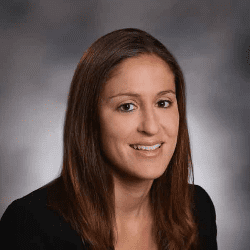Voices: Growing Pains – A Love Story | Mae Zakhour, MD

Mae Zakhour, MD
Shortly after having my first child, which was five days before my fellowship graduation, a mentor of mine described parenthood in a way that resonated with me, even though at the time, I didn’t understand much of motherhood beyond the sleepless newborn nights, the milk-stained scrubs, and the caffeine-fueled attempts to soothe a baby while closing patient charts. She described early parenthood broadly in two phases: the physical demands of the first few years, and the mental and emotional demands that come later, as children become less physically taxing and more in need of existential guidance.
As a junior attending, I have found this analogy to ring true when applied to our careers as well. The physical demands of residency and fellowship, rivaled only perhaps by the demands of caring for a tiny newborn human, then shift to the mental strategizing and emotional weight of managing our attending careers and caring for patients who often die under our care. As a new attending physician four years ago, I felt the mental anguish of a postoperative complication much more profoundly than I ever had before. This was my patient, and I was responsible for this. While I undoubtedly cared deeply for my patients while I was a fellow, I now built relationships that would sometimes last years. I was now the person that these women identified as their doctor, and I did not take this role lightly.
It is not a perfect dichotomy, of course. There is a lot of overlap. Some of my OR days are arduous, and some of my call weeks are physically draining. At 37 years old, I joke with my fellows that I am young enough to be a millennial but old enough to need NSAIDs at the end of a long debulk. But in general, much of the physical exhaustion of fellowship, with its cringeworthy and relentless pager (is there any tolerable pager tone?) and its endless to-do list of checkboxes, has gone by the wayside.
Rather, the physical demands of parenting young children have set in. My hours at home consist of orchestrating monster truck rallies, pretending to be a dinosaur, and cooking gourmet macaroni and cheese with camouflaged vegetables. And although I am still a few years away from helping navigate puberty, heartbreaks, and all that is middle school, I get glimpses of these “big kid” parental challenges from time to time. “Why are those people saying ‘black lives matter,’ mommy?” Asks my four-year-old son, peering over my shoulder as I stream the news on my computer. This is not a question that should wait until middle school for an answer. I take a deep breath and think of how to answer this question in a way that will make sense to my toddler.
As with many difficult conversations with my patients, honesty and compassion go a long way. Maybe I don’t have all the answers. Maybe I don’t know the next best step. But I will share what I know and will be honest about the things I do not. Maybe my career will prepare me for parenting a middle schooler. Or maybe nothing can do that.
Mae Zakhour, MD, is a gynecologic oncologist at the University of California, Los Angeles.